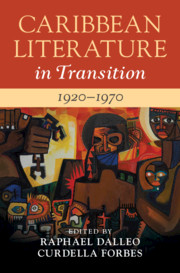Book contents
- Caribbean Literature in Transition, 1920–1970
- Caribbean Literature in Transition
- Caribbean Literature in Transition, 1920–1970
- Copyright page
- Contents
- Figure
- Contributors
- Introduction
- Part I Literary and Generic Transitions
- Part II Cultural and Political Transitions
- Chapter 7 Debating Language
- Chapter 8 Periodical Culture
- Chapter 9 Decolonizing Education
- Chapter 10 Imaginaries of Citizenship and State
- Chapter 11 Postcolonial Stirrings
- Part III The Caribbean Region in Transition
- Part IV Critical Transitions
- Bibliography
- Index
Chapter 7 - Debating Language
from Part II - Cultural and Political Transitions
Published online by Cambridge University Press: 16 December 2020
- Caribbean Literature in Transition, 1920–1970
- Caribbean Literature in Transition
- Caribbean Literature in Transition, 1920–1970
- Copyright page
- Contents
- Figure
- Contributors
- Introduction
- Part I Literary and Generic Transitions
- Part II Cultural and Political Transitions
- Chapter 7 Debating Language
- Chapter 8 Periodical Culture
- Chapter 9 Decolonizing Education
- Chapter 10 Imaginaries of Citizenship and State
- Chapter 11 Postcolonial Stirrings
- Part III The Caribbean Region in Transition
- Part IV Critical Transitions
- Bibliography
- Index
Summary
Language has long been acknowledged as a site of contestation in the Creole-anglophone Caribbean. English has, traditionally, been the exclusive language of both literary text and critical analysis. Conversely, the various Creoles of the Caribbean are not generally recognized as languages, let alone appropriate modes of literary expression. Debates about this contentious issue became a major flashpoint in the 1950s with the publication of V. S. Reid’s New Day (1949) and Sam Selvon’s The Lonely Londoners (1953) in which Creole-speaking characters take centre stage. These debates gathered impetus in the 1970s with the publication of Merle Hodge’s Crick Crack, Monkey, Mervyn Morris’ positioning of Louise Bennett as a ‘serious’ writer following the publication of her volume Jamaica Labrish (1966), and Kamau Brathwaite’s 1970 establishment of the journal Savacou, all of which engaged the vernacular as a literary language. The growing influence of sociopolitical eruptions such as the Rastafari movement and Black Power also signified influential developments in the thinking about language. Through an examination of poetry and prose, the chapter assesses the significance of the historical debates about language beginning in the eighteenth century and concluding with a brief discussion of the legacy of these contestations in the present.
Keywords
- Type
- Chapter
- Information
- Caribbean Literature in Transition, 1920–1970 , pp. 115 - 130Publisher: Cambridge University PressPrint publication year: 2021

